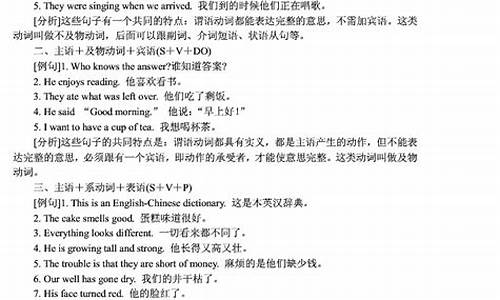您现在的位置是: 首页 > 名人语录 名人语录
下一个句子用英语怎么写_下一个句子的英语怎么读
tamoadmin 2024-08-28 人已围观
简介1.谁能告诉我这几个英语单词和句子怎么读啊?用汉语标出来。2.一到十英语单词怎么读3.英语句子到底该怎么重读4.一个英语句子里,那些要强读,那些要弱读5.痛到心碎的句子英语怎么说 高中英语的好句子 导语:高中英语阅读和写作的技巧离不开对单词和经典句子的积累。下面是我整理的高中英语的好句子大全。欢迎大家阅读。 篇一:高中英语句型大全 1. be do
1.谁能告诉我这几个英语单词和句子怎么读啊?用汉语标出来。
2.一到十英语单词怎么读
3.英语句子到底该怎么重读
4.一个英语句子里,那些要强读,那些要弱读
5.痛到心碎的句子英语怎么说

高中英语的好句子
导语:高中英语阅读和写作的技巧离不开对单词和经典句子的积累。下面是我整理的高中英语的好句子大全。欢迎大家阅读。
篇一:高中英语句型大全
1. be doing/ be about to do/ had done?, when?(when:这时, 强调一个动作的突然发生)
1).I was walking along the river, when I heard a drowning boy cry for help.
2). I was about to lee when it began to rain.
3). I had just finished my test paper when the bell rang, announcing the exam was over.
2. It was (not ) + 时间段+before +一般过去时 过了一段时间就.. It will (not )be+ 时间段+before +一般现在时 要过一段时间才会? It is/ has been +时间段+ since?..
It was +点时间+ when?..
It was +时间状语+ that ?..(强调句)
1). It was not long before he sensed the danger of the position.不久他就意识到他处境危险(动作已发生)
2). It will be half a year before you graduate from the school. 还有半年你才从这个学校毕业(动作未发生)
3). It is 3 years since he worked here.=he left here.(since从句中的谓语动词若是延续性动词,要从这个动作结束的时候算起)
4). It was 3 o’clock when they received the telephone.
5) It was at 3 o’clock that they received the telephone.
3. no +比较级 +than: A 与B都不? /仅仅,只有
Not+比较级 +than: A 不如B / 不超过,至多
more? than? 与其?.倒不如(= not as/ so..as) more than=not only 不仅仅..
1). He works no harder than I.他和我都不用功
2). He doesn’t work harder than I.他不如我用功
3). There are no more than seven people in the room. 屋里仅有七个人
4). There are not more than seven people in the room. 屋里至多有七个人
5). He is more diligent than clever. 与其说他聪明,倒不如说他勤奋
6)It is more like a meeting than like a party.--> It is not as a party as a meeting
7).Mr. Zhang is more than my teacher, he is also my best friend. 张先生不仅仅是我的老师,他还是我的朋友
4. once?..一旦?.., 表示时间和条件
1)Once you understand what the teacher explained, you will he no difficulty doing the work.
2).Once you he decided to do something, you should finish it and do it well.
5. The +比较级.,the +比较级..越, 越
1) The more books you read, the more knowledge you will get.
2)The busier he is, the hier he feels.
6. as if/ as though?..(表示与事实相反,用虚拟;若表示即将成为事实或有可能成为事实,则用陈述语气)
1). He was in great trouble, but he acted as if nothing had hened.
2). Although they just met for the first time, they talked as if they had been
friends for many years.
3). The clouds are gathering. It looks as if it is going to rain.
7. n. /adj. / adv. / v. + as / though +主语+谓语, 尽管,.引导让步状语从句
1).Child as he is, he already knows what career he wants to follow.
2). Try as he might, he couldn’t solve the problem.
3). Much as I respect him, I can’t agree with his idea.
8. whether?.or?. 无论是?.还是?.
1). Whether the weather is good or bad, they will set off as they planned.
2). Any person, whether young or old, has his own worth.
9. 疑问词+ever = no matter +疑问词, 引导让步状语从句或名词性从句
1).Whichever(=No matter which) you like, you can take it away.( 让步状语从句) You can take away whichever(=any one that) you like ( 名词性从句)
2). Whenever you comes, you will be welcome. ( 让步状语从句)
3). Whatever hens, I will support you. ( 让步状语从句)
4). Whoever/ No matter who breaks the law, he will certainly be punished. ( 让步状语从句)
Whoever breaks the law will certainly be punished. ( 名词性从句)
5). However great the difficulty is, we can overcome it. ( 让步状语从句)
10. if/ as long as/so long as/ providing that/ provided that/ supposing that/ on condition that 如?..
1). I will lend you money on condition that you can return it within 3 months.
11. given that/ considering that 考虑到?.., 鉴于
1). Given her interest in children/ Given that she is interested in children, I’m sure teaching is the right career for her.
2). Considering his age and his experience, he has done well.
12. in case that/ in case of?.. 万一?.., 以防?..
1). In case of fire, please dial 119 at once.
2). In case that John comes/ John should come, tell him to wait.
13. 祈使句+ or/otherwise +结果句 或 祈使句+ and +结果句
1). Stop doing such foolish thing, or you will be punished in time.
2). More effort, and the problem would he been settled.
3). Think it over, and you will find the answer.
14. so/ such..that.引导结果状语从句时须注意
当名词前有many, much, little, few修饰时, 用so不用such因为此时的中心词不再是名词,而是many, much, little, few这些表示数量的词。
1). The westerners eat so much fat and sugar that they put on weight easily.
2). There are so few fish in the lake that we couldn’t fish them easily. 当名词是单数可数名词,前面又由adj.修饰时,注意冠词的位置,即so+ adj +a(n)+n 或such+ a(n) + adj.+ n
He is such an honest person/ so honest a person that you can depend on him whenyou are in trouble.
( so / as / too / how + adj. + a/ an + N.)
当so/such引导的部分位于句首时,主句要用部分倒装结构
Such great progress has he made in his studies that we all admire him. 当主从句主语一致时可与动词不定式相互转换,即变成so/such.as to do结构。 The westerners eat so much fat and sugar as to put on weight easily.
15. so that 引导目的状语从句与结果状语从句
?so that引导目的状语从句时常与情态动词连用(= in order that),当主从句主语一致时可转换为so as to do/ in order to do.
1). He turned up the radio a little so that he could hear the news clearly. He turned up the radio a little so as to hear the news clearly.
2). He closed all the windows while driving so that he shouldn’t catch cold. (否定句中情态动词用shouldn’t)
so that 引导结果状语从句一般不与情态动词连用
He turned up the radio a little so that he heard the news clearly.
16.can never/ can’t 与too, too much, enough, 搭配表示“无论怎样?.都不过分”
1). While you are doing your homework, you can’t be careful enough.
2). He is such a great man that we can’t praise him too much.
3). William Hartley was handsome, determined and hardworking, in a word, I couldn’t speak too highly of him.
4). The development of society has made it necessary for us to he a good knowledge of English, so we can’t emphasize the importance of learning English too much.
5). Since it is a good thing, we can’t do it too soon.
17. 不定式作主语,it作形势主语:
It +系动词+adj./ n..+ for sb. to do (for sb.表示动词不定式动作的执行者) It +系动词+adj.+ of sb. to do (of sb.既表示动词不定式动作的执行者有表示人所具备的性质或特征)
1). It’s important for us to he a good knowledge of English.
2). How rude of him it is to treat a child like that!
3). It’s thoughtful of him to put us up for the night.
18. 不定式作宾语,it作形势宾语:
主语+think/ consider/believe/ make/ feel+ it +adj./n. +for sb./ of sb. +to do
1). I feel it foolish of him to believe such a man.
2). The timely rain had made it possible for the crops to grow well.
19. won’t/ can’t he sb. doing/ done 不能容忍某行为发生
1). You are too rude, and I won’t he you speaking to Mother like that again.
2). We can’t he anything done against the school rules.
20. It is said/ thought/ hoped/ believed?..that
Sb. is said/ thought/ hoped/ believed to do?..
1). It is said that he is studying abroad.--> He is said to be studying abroad.
2).It is considered that many countries highly value China’s role in helping world’s peace.
Many countries is considered to highly value China’s role in promoting world’s peace.
21. 表示过去原打算干,却未曾实现的愿望、打算或意图
had hoped to do=hoped to he done.类似的词还有:expect, think, intend, design,
plan, mean, suppose等
would like/prefer/ love to he done
was/ were to he done
was/were supposed to he done
1).--- Did you go to see the film “Titanic” last night?
---I’d like to he, but I had an unexpected guest.
2). The plane was to he taken off at 7 this morning, but was held up by the hey fog.
22. How did sb come to do?..? = How come?.为什么会?../是怎么回事?表示要求对所发生的事情说明理由或做出解释
1). How did you come to find out where she’s living?= How come you found out?. 你是怎么打听到她住在哪儿的?
2). How come you sat there, doing nothing? 为什么坐在那儿什么也不干?
3). How did he come to be so foolish?
23. when it comes to?.. 当谈到或涉及到
1).He is a man of few words, but when it comes to playing computer, he will be excited and full of energy.
2). When it comes to helping his wife with the housework, John never complains.
24.every time/ each time/ next time/ the first time/ any time等短语引导时间状语从句,表示“每当?.., 每次?..,下次?..”
1). Every time you meet with new words while reading, don’t always refer to your dictionary.
2) Next time you come, do remember to bring your son here.
3) You are welcome to come back any time you want to.
25. There is (no) need to do?../ for ?.-àIt is( not )necessary for sb. to do?. There is( no )hope/ chance / possibility of doing?.
There is( no )difficulty / point /sense( in )doing
1). Is there any chance of our winning the match?
2). There is no point in discussing the problem again.
26.It is up to sb. to do sth. 应由某人来做某事..
1) ---When shall we start out? ---It’s up to you to decide.
2). It’s up to you to babysit my son while I am away on business.
27.be up to sth. 忙于?.., 从事., 胜任?.. (不要求掌握)
1). John isn’t really up to that job. 约翰不适合干那项工作
2).What he you been up to recently? 最近你一直在忙些什么
28. It is time to do/ It is time that +主语+动词的一般过去式 该是做?..的时候了
It is time that we ended the discussion.
29. it 强调句:
基本构成形式:It is/ was +被强调部分+ who/ that+原句剩余部分
e.g.: I met him in the street yesterday afternoon.
1)It was I who/ that met him in the street yesterday afternoon.(强调是我,不是别人)
2)It was him who/ that I met in the street yesterday afternoon.( 强调我遇见的`是他,不是别人)
3)It was in the street that I met him yesterday afternoon.( 强调是在大街上,不是在别的地方,强调的是地点,但不用where)
4)It was yesterday afternoon that I met him in the street (强调是昨天下午,不是在别的时候, 强调的是时间,但不用when)
强调句的一般疑问句:Is/ Was it +被强调部分+ who/ that+原句剩余部分
强调句的特殊疑问句:What/ When/ Where/ Who/ Howis/ was it + who/ that+原句剩余部分
1). Who was it that/ who you met in the street yesterday afternoon?
Tell me who it was that/ who you met in the street yesterday afternoon?
30.do, did, does 用于强调谓语动词,加强语气
1). He is a good student.--> He does be a good student
2). He helped us yesterday. à He did help us yesterday.
3). Be careful! àDo be careful!
31.There be 句型:
there be 之后如有几个并列主语,be 动词的选择要取决于第一个主语,即就近原则。 There is a pen and two books on the desk.
There are two books and a pen on the desk.
There be 句型中,be动词还有其他变化形式,常见的有:There seem to be,
There hen to be, There used to be, There is likely to be, There he been/has been 等
1). There seems/ ears to be much hope of our team winning the match.
2). There hened to be nobody in the room when I came in.
3). There he been great changes in my hometown since 18.
4). There used to be a bus station at the corner of the street.
5). There are likely to be more difficulties than expected while we are carrying out the plan.
There be句型的独立主格结构作状语:(有连词,用句子,没有连词,用独立结构)
1). There being no buses, we had to walk home.
= Because there were no buses, we had to walk home.
2). There hing been no rain for a long time, the crops in the field died. = Because there had been no rain for a long time, the crops in the field died. There be句型的非谓语形式:
1). I don’t want there to be any misunderstanding between us.
2). We expect there to be a chance of studying abroad.
3). It is usual for there to be a generation gap between parents and children.
32. not/ never . until 直到?..才
e.g. The villagers didn’t realize how serious the pollution was until all the fish died in the river.
It was not until all the fish died in the river that the villagers realized how serious the pollution was. (强调句)
Not until all the fish died in the river did the villagers realize how serious the pollution was.(倒装句)
33. not only?.. but (also)?.
;谁能告诉我这几个英语单词和句子怎么读啊?用汉语标出来。
英语连读相邻的两词在意义上必须密切相关,同属一个意群,连读所构成的音节一般都不重读,只需顺其自然地一带而过,不可读得太重,也不可吞音。(连读符号:~)
连读现象只出现在意群内部,意群与意群之间的两个相邻单词即使符合上面所讲的两个条件,也不连读。
如:I hope it\'ll get a little warmer.
这个句子中的hopeit就不连读为/ hupit /,因为主句Ihope是一个意群,后面的从句是另一个意群。
扩展资料(1)“辅音+元音”型连读
在同一个意群里,如果相邻两词中的前一个词是以辅音结尾,后一个词是以元音开头,这就要将辅音与元音拼起来连读。
(2)“r/re+元音”型连读
如果前一个词是以-r或者-re结尾,后一个词是以元音开头,这时的r或re不但要发/r/,而且还要与后面的元音拼起来连读。
(3)“辅音+半元音”型连读
英语语音中的/j/和/w/是半元音,如果前一个词是以辅音结尾,后一个词是以半元音,特别是/j/开头,此时也要连读。
(4)“元音+元音”型连读如果前一个词以元音结尾,后一个词以元音开头,这两个音往往也要自然而不间断地连读到一起。
(5)当短语或从句之间按意群进行停顿时,意群与意群之间即使有两个相邻的辅音与元音出现,也不可连读。
一到十英语单词怎么读
active 诶磕踢负
quiet 快特
very V诶瑞
who s your art teacher? 乎丝哟啊特踢吃额?
waht s he like? 挖次HI赖磕?
He s short and thin. HI丝虚哦特俺的丝IN.
who s your principal? 乎丝哟PE日IN撒PE?
no she s oid.she s very kind.NO西亿死欧的。西已死V诶瑞磕哎的。
英语句子到底该怎么重读
一到十英语单词怎么读如下:
1到10的英文按顺序排列分别是:one、two、three、four、five、six、seven、eight、nine、ten。另外其分别对应的序数词是:first(第一)、second(第二)、third(第三)、fourth(第四)、fifth(第五)、sixth(第六)、seventh(第七)、eighth(第八)、ninth(第九)、tenth(第十)。
基础词的用法:
1、基数词的复数形式表示大量的数目:在这种情况下,表示单位的基数词(hundred, thousand, million, billion)不能在词尾加-s。
2、基数词的复数形式表示大量的 的数目,在这种情况下,表示单位的基数词词尾加-s,要与of短语连用。
3、基数词在句中的作用:基数词的作用相当于名词和形容词,它在句子中可充当主语,宾语,表语和定语。
英国有大大小小数十种英语口音。下面的内容介绍了英格兰南部和威尔士所用的皇室口音或”标准英音”Received Pronunciation,也就是外国人对英国人说话的固有印象,尽管这种口音在现代英国其实几乎从未用过。
1. “R”不发音
要知道,大多数说英音的人发R音的时候都不卷舌(除了那些来自苏格兰、诺森比亚、北爱尔兰和兰开夏郡部分地区的人),但并非所有英式口音都相同。元音之后的R不要发音,同时拉长元音,还可以加上一个“uh”音(here就读成“heeuh”)。在像“hurry”这样的单词中,不要把R和元音混在一起,要读成“huh-ree”。
在美式英语中,以“rl”或“rel”结尾的单词发音时可以用一个或两个音节,没有区别。但在英式英语中就不同。以“rl”结尾的单词,如“girl”、“hurl”等只发一个音节,R不发音;而“squirrel”则要读成“squih-rul”,而“referral”则为“re-fer-rul”。
有些单词用英式口音读起来比较轻松。比如“mirror”读起来就是“mih-ra”。别把它读得像“mere”一样,英国人几乎从不这么发音。
2. 字母“U”在“stupid”和“duty”中的发音为“ew”,和单词“you”一样
不要像美式口音那样发“oo”音,所以正确的发音应该是stewpid ,或者schewpid 也很常见,但不是stoopid ;而duty 应该是“dewty”,或更常见的“jooty”。在标准英音中,“A”(比如在“father”中)应该是在口腔后部发的开嗓音,听起来就是“Arh”。
这点在几乎所有英式口音中都不例外,不过在标准英音中尤为突出。在英格兰南部和标准英音中,诸如“bath”、“path”、“glass”和“grass”这样的词也发这个元音(bawth、pawth、glawss和grawss,等等)。不过在英国其他地区,“bath”、“path”这些词还是发“ah”音。
3. 辅音较多的单词要发音清晰
“duty”中的T 发T 音:不要像美语中那样发成D ,读成doody,所以“duty”应该读dewty ,或者柔和一点,jooty 。读后缀“-ing”的时候要加重“G”的后鼻音。这样听起来就应该是“-ing”而非“-een”。不过有时候也会缩短为“in”,比如“lookin”。
“human being”这个词组要读成“hewman being”,有的地区读成“youman been”,不过也可以是“hewman bee-in”。
4. 略去“T”
包括伦敦腔在内的某些口音中,单词中的“T”不发音,而美国人会用“D”取而代之。不过在原本“T”的位置上通常会有短暂的停顿。
所以“battle”的发音就应该是“Ba-ill”,在第一个音节末尾含住舌根的气息,然后在发第二个音节的时候才把它吐出来,这就是所谓的“喉塞音”glottal stop。 美国人也用喉塞音,比如像“mittens”和“mountain”这样的词,只是英国人用得更多罢了。
说河口英语、标准英音,以及操苏格兰、爱尔兰和威尔士口音认为把“T”吞掉是懒惰粗鲁的行为,因此也就没有这种发音方法。不过几乎在所有口音中,在非正式情形下单词中间的T不发音,都是可以接受的;而在词尾加上喉塞音就更加普遍了。
5. 请注意,有些单词的发音与拼写是一致的
单词“Herb”的发音中有“H”的音,而“Often”通常都读成“Off tin”而非“Off in”。单词“Been”的发音为“Bean”,不是“bin”或者“ben”。
“Again”和“renaissance”读成“a gain”和“run nay s?nce”,“ai”的发音和在“pain”中一样,而不是“said”中那样。以“body”结尾的单词也都按照拼写发音,如“any body”而非“any buddy”,不过“O”的发音是英式的短促音。
一个英语句子里,那些要强读,那些要弱读
在一般情况下英语句子重读的规律:
1、在句子中比较重要的词都要重读,使这个词的发音响亮而清晰。在句子中需要重读的词有名词、动词、形容词和副词。
2、冠词、连接词、介词、助动词和人称代词等所谓的虚词,一般都不要重读,但当助动词、介词和代词放于句首时,助动词置于句尾时要重读。?
3、在句子中每个重读音节间相隔的时间大致相等的,在重读音节之间的弱读音节要读得较快一些,好像是音乐中的打拍子一样。在学习句子的读法时,特别要体会一轻一重或一重一轻的节奏感。?
句子重音的功能 :体现句子的节奏感和韵律感。?突出重点,使听者更容易理解。 例如:
1、The streets are wide and clean. (这句话中的streets是名词,wide和clean是形容词,它们都要重读;the, are, and不重读。)?
2、I am so glad to see you again. (这句话中的so, glad, see, again要重读,而I, am, to, you不重读。)?
有时候虚词也要重读,以下几点需注意:
1、强调或突出某个虚词或be动词时,应将其重读。例如:?
We saw him playing by the river.(这句话中的we和him一般不重读,但为了表示强调也可以重读。比如,如果we重读,则强调是#我们#而不是别人看见。)?
2、介词在句首时往往要重读。例如:?
On my way to school, my bike was broken. (这句话中的on在句首应重读。)?
3、be动词及助动词和not结合时要重读。
4、句子末尾的be动词和助动词一般要重读。例如:?
-Are you a student? -Yes, I am. (这里的am要重读。)?
扩展资料:
降调的特点:如果句子的第一个音节是重读音节的话,那么第一个音节最高,然后顺此向下降,最后一个重读音节用降调。如:`Mother?has?`gone?to?`town↘(降).。
如果是以非重读音节开始的话,那么开始的非重读音节很低,句子中的第一个重读音节最高,然后顺次向下降,最后一个重读音节用降调。如:I?shall?`call?you?to`morrow?`morning↘(降)。
降调的用法:?陈述句、特殊疑问句、祈使句(表示命令)、?惊叹句。?
升调的特点: 如果句子的第一个音节是重读音节的话,那么第一个音节最高,然后顺此向下降,最后一个重读或非重读音节用升调。如:`He?you?been?`staying?here?`long?↗(升)?
如果是以非重读音节开始的话,那么开始的非重读音节很低,句子中的第一个重读音节最高,然后顺次向下降,最后一个重读或非重读音节用升调。
如:?Is?he?`coming?to`morrow?`morning?↗(升)?
升调的用法:?升调一般用于一般疑问句、祈使句(表示委婉、客气)、陈述句(含有感彩时,如不肯定、疑问、安慰、不耐烦等)。
痛到心碎的句子英语怎么说
在英语句子中,实词(包括名词、实义动词、形容词、副词、数词等)一般都接受句子重
音,为重读词,用强读式。
弱读式:虚词(包括介词、代词、连词、冠词等功能词)一般都不接受句子重音,为非重读词,用弱读式。
1.
弱读式只出现在句子的非重读词中,如:Pass me the book.把书给我。
代词me和定冠词the 弱读,用弱读式,分别读作/mi/和/?i/。
You can come later.你可以稍后再来。
情态动词can 弱读,用弱读式,读作/k?n/。
2.
单词单独出现时,无论用实词还是虚词都用强读式,如:do /du:/做; sun /s?n/太阳;clean /kli:n/干净的
3.
出现在句首或句末的单词,无论是实词还是虚词都用强读式。
That is my sister.那是我的姐姐。
句首的代词that 用强读式,读作/?t/。
4.
在句中被特别强调的实词或虚词,用强读式,如:I am Peter.我就是彼得。
句中的be动词am 被强调,用强读式,读作/?m/。
虚词的强读式和弱读式
一般情况下,虚词在句子中不重读,常以弱读形式出现在语流中。因而,虚词一般有一个或一个
以上的弱读形式。
1、Se your heart to somebody who cares. 把你的心交给在乎它的人.
2、I even dead,also you together. 我就算死,也要拉着你一起死。
3、Find a worthy hell-bent person, love.找一个值得死心塌地的人,好好爱。
4、I lost my love, how can you make me lost.我失恋了,你怎么可以把我弄丢了。
5、In my heart was in my eyes I ever let you choose. 入我心还是入我眼 我从来都是让你选。
6、Give you a gentle knows more than I who live in your chest. 谁住在你的胸口比我更懂得给你温柔。
7、Tears down a wipe, and then without a word to go.顺着泪痕一点一点擦净,然后一句话也不说就走。
8、to live in a world without you is more painful than any punishment. do you know that no one can replace you in my heart?
9、How to get away from the misery of love. I know my past hope.怎么赶不走失恋的苦恼。我知道我无可救药。
10、You cant be my poem, just as I cant be your dream. 你不能做我的诗,正如我不能做你的梦。
11、Dont be afraid, just like my this heart, forever is your home.别怕,就像我的这颗心,永远都是你的家。
12、生活在没有你的世界,比任何一种惩罚都要痛苦,你知道吗,对我而言,你是任何人都无法取代的。
13、A person go, a person to sleep, a person cry, a person laugh, the end is a person.一人走,一人睡,一人哭,一人笑,终是一人。
14、Dont realize too much which will let you down. 不要知道得太多,会难过。以下是痛到心碎的句子英语怎么说,欢迎大家来阅读。
15、the fact is that the world is out of everyones expectation. but some learn to forget, but others insist.事实上,这个世界不符合所有人的梦想。只是有人可以学会遗忘,有人却坚持。
16、the so-called freedom is the reason to be alive. if u easily give up life, then u can never find freedom.所谓的自由,就是自己活着的理由,如果轻易放弃生命,那么在哪里都找不到自由的。
上一篇:文案简短高质量_文案精短
下一篇:名言励志诗词_名句名诗励志









